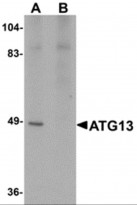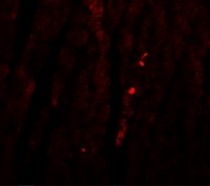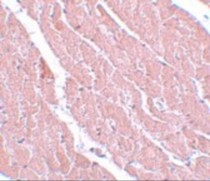ARG55112
anti-ATG13 antibody
anti-ATG13 antibody for ELISA,ICC/IF,Immunohistochemistry,Western blot and Human,Mouse,Rat
Cancer antibody; Cell Death antibody; Metabolism antibody
Overview
| Product Description | Rabbit Polyclonal antibody recognizes ATG13 |
|---|---|
| Tested Reactivity | Hu, Ms, Rat |
| Tested Application | ELISA, ICC/IF, IHC, WB |
| Specificity | Multiple isoforms of ATG13 are known to exist. |
| Host | Rabbit |
| Clonality | Polyclonal |
| Isotype | IgG |
| Target Name | ATG13 |
| Antigen Species | Human |
| Immunogen | Synthetic peptide (15 aa) within aa. 450-500 of Human ATG13 protein. |
| Conjugation | Un-conjugated |
| Alternate Names | KIAA0652; Autophagy-related protein 13; PARATARG8 |
Application Instructions
| Application Suggestion |
|
||||||||||
|---|---|---|---|---|---|---|---|---|---|---|---|
| Application Note | * The dilutions indicate recommended starting dilutions and the optimal dilutions or concentrations should be determined by the scientist. | ||||||||||
| Positive Control | Rat Heart Tissue Lysate | ||||||||||
| Observed Size | ~ 49 kDa |
Properties
| Form | Liquid |
|---|---|
| Purification | Affinity purification with immunogen. |
| Buffer | PBS and 0.02% Sodium azide |
| Preservative | 0.02% Sodium azide |
| Concentration | 1 mg/ml |
| Storage Instruction | For continuous use, store undiluted antibody at 2-8°C for up to a week. For long-term storage, aliquot and store at -20°C or below. Storage in frost free freezers is not recommended. Avoid repeated freeze/thaw cycles. Suggest spin the vial prior to opening. The antibody solution should be gently mixed before use. |
| Note | For laboratory research only, not for drug, diagnostic or other use. |
Bioinformation
| Database Links | |
|---|---|
| Gene Symbol | ATG13 |
| Gene Full Name | autophagy related 13 |
| Background | ATG13 Antibody: Autophagy, the process of bulk degradation of cellular proteins through an autophagosomic-lysosomal pathway is important for normal growth control and may be defective in tumor cells. It is involved in the preservation of cellular nutrients under starvation conditions as well as the normal turnover of cytosolic components. This process is negatively regulated by TOR (Target of rapamycin) through phosphorylation of autophagy protein ATG1. ATG13 forms a complex with ULK1 and ULK2, the mammalian homologs of ATG1, and with FIP200. This complex is a target of TOR phosphorylation under normal conditions; inhibition of TOR by rapamycin or leucine deprivation leads to dephosphorylation of ATG13, ULK1 and ULK2, which then leads to autophagy. Knockdown of ATG13 inhibits autophagosome formation. |
| Function | Autophagy factor required for autophagosome formation and mitophagy. Target of the TOR kinase signaling pathway that regulates autophagy through the control of the phosphorylation status of ATG13 and ULK1, and the regulation of the ATG13-ULK1-RB1CC1 complex. Through its regulation of ULK1 activity, plays a role in the regulation of the kinase activity of mTORC1 and cell proliferation. [UniProt] |
| Research Area | Cancer antibody; Cell Death antibody; Metabolism antibody |
| Calculated MW | 57 kDa |
| PTM | Phosphorylated by ULK1, ULK2 and mTOR. Phosphorylation status depends on nutrient-rich conditions; dephosphorylated during starvation or following treatment with rapamycin. ULK1-mediated phosphorylation of ATG13 at Ser-355 is required for efficient clearance of depolarized mitochondria. |
Images (3) Click the Picture to Zoom In
-
ARG55112 anti-ATG13 antibody WB image
Western blot: rat heart tissue lysate stained with ARG55112 anti-ATG13 antibody at 1 ug/ml dilution in (A) the absence and (B) the presence of blocking peptide.
-
ARG55112 anti-ATG13 antibody IHC image
Immunohistochemistry: ATG13 in Mouse Heart tissue stained with ARG55112 anti-ATG13 antibody at 20 ug/ml dilution.
-
ARG55112 anti-ATG13 antibody IHC image
Immunohistochemistry: ATG13 in mouse heart stained with ARG55112 anti-ATG13 antibody at 5 ug/ml dilution.








